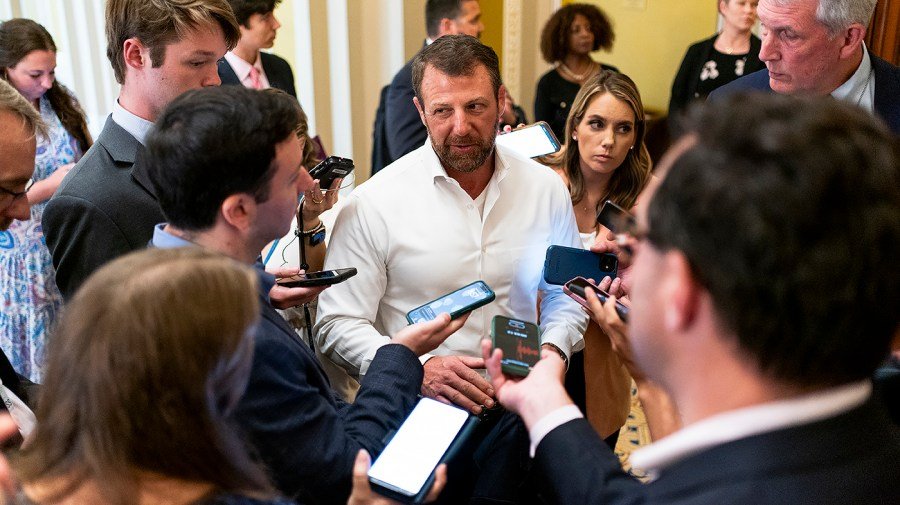
It’s crunch time for negotiations over the state and local tax (SALT) deduction cap.
After a high-stakes meeting with Treasury Department Secretary Scott Bessent on Wednesday, House Republicans in the SALT Caucus and a key GOP senator reported “progress” but no deal, leaving one of the thorniest issues in the party’s tax and spending bill unresolved.
Stakeholders say talks have zeroed in on keeping in place the $40,000 deduction cap — which the SALT Caucus negotiated in the House — but lowering the $500,000 income threshold and adjusting the numbers for inflation, a compromise of sorts that would appease moderate House Republicans while also placating Senate conservatives.
The clock, however, is ticking: Senate GOP leaders are hoping to put their version of the “big, beautiful bill” on the floor by Friday — officially kicking off the consideration process — but can’t move forward without a SALT deal.
Some lawmakers say an agreement is imminent.
“We’ve made a little bit of progress; we’re still working through it,” Sen. Markwayne Mullin (R-Okla.), a former House member who has served as a key liaison between the chambers, told The Hill after Wednesday’s meeting. “I think we’ll have something shaken out by tomorrow — maybe, hopefully. I think we’re in good shape.”
Others, however, were more pessimistic. Rep. Nick LaLota (R-N.Y.), a key member of the SALT Caucus who attended the meeting with Bessent on Wednesday, said the gathering was “pleasant” and “cordial,” but the two chambers are still a ways away from consensus.
“Everybody wants a deal, everybody wants to get to yes, everybody wants to put the nation on a better track,” LaLota said. “But it does seem like the Senate and the House right now are far apart.”
In one signal that negotiations may be approaching their final phase, Bessent huddled with Republicans on the issue twice this week, meeting with Senate Republicans on Tuesday and SALT Caucus members Wednesday.
Attendees were coy about the contents of the meeting, though some said they were glad to see the Cabinet member taking an increasingly active role. Lawmakers didn’t emerge from the meeting floating any new policy proposals, but instead making tweaks to existing parameters.
“He’s a former constituent and certainly understands my district, understands the issue of SALT, so I think it’s good to engage in the conversation with the secretary,” said Rep. Mike Lawler (R), who represents New York’s 17th Congressional District.
Asked if Bessent’s presence should be taken as a sign that a deal is close, LaLota replied, “I hope that we’re closer today than we were yesterday.”
“He’s the Treasury secretary speaking on behalf of the administration on a bill that affects the nation’s financial well-being,” LaLota said.
According to one Senate GOP aide, Mullin and the White House presented multiple options to the SALT Caucus members. Those would likely keep the $40,000 figure in place, but would focus on altering the threshold and cap phaseouts to secure more savings.
“We’re getting close to where we need that issue landed,” Senate Majority Leader John Thune (R-S.D.) said, adding that talks have been “very productive” of late. “This is one of those deals where nobody’s going to get everything that they want.”
Lawler seemed to agree.
“Well we’re near the end of the bill, aren’t we? I mean, the Senate is barreling towards a vote, and obviously the president and the White House want to get this bill across the finish line. So, obviously we’re getting towards the end here,” he said.
Moderate House Republicans from high-tax blue states — including New York, New Jersey and California — have been at odds with Senate Republicans for months over SALT, with stakeholders in the lower chamber pushing for a higher deduction cap and those in the upper chamber voicing sharp opposition to such a move.
The disagreement escalated into a full-on fight earlier this month when the Senate Finance Committee released its portion of the megabill that had a $10,000 deduction cap for individuals making $500,000 or less — down from the $40,000 cap House SALT Caucus members landed after months of tenuous negotiations with their leadership. The cap, as implemented in the 2017 Trump tax cuts, currently stands at $10,000.
Now, members are trying to bridge that gap. After initially shutting down the idea of lowering the $500,000 income threshold — “I am done negotiating,” LaLota told The Hill when asked about the prospect last week — key lawmakers in the SALT Caucus appear open to the proposal, if the price is right.
“The Senate’s been describing it like that, yes, to not futz with the $40K deduction, but it seems that they’re endeavoring to change the $500K income cap,” he told reporters Wednesday. “And I’ve been clear, if they do that, if they water the income cap down, they need to strengthen other provisions like the inflation adjustment.”
“Otherwise, it’s not a compromise,” he added. “Otherwise, it’s them just trying to jam their preferences down our throats.”
The phaseout figures are also something Senate GOP members are angling to lower. The House GOP plan would have shrunk the deduction cap down to $10,000 for individuals making $600,000 — giving Senate Republicans another area they believe they can find much-needed savings.
Negotiations on the topic were always poised to be difficult. No Senate Republicans hail from high-tax blue states, leaving SALT without an advocate in the upper chamber — a stark difference from the House GOP conference, as leadership in both chambers is acutely aware of.
“We’ve been clear from the very beginning with our Senate counterparts that the issues with SALT in the House are very different than the issues in the Senate,” House Majority Leader Steve Scalise (R-La.) said. “We have about a dozen members that are voting on this bill exclusively based on what happens with SALT. There’s not a single senator on the Republican side that has that same issue.”
“So, it is a House challenge that we’ve had to work on from the beginning that just doesn’t exist over in the Senate side,” he added. “But it has to get resolved if you’re going to have a bill that passes.”
Mullin has held numerous discussions with the key House faction in recent days, having told reporters throughout that stretch that the goal was not necessarily to strike an agreement but to get to a point of “acceptance.”
“I don’t think either side is going to like it,” he said Tuesday, adding that they need to get “to the point where it’s palatable enough to take it and not vote not against, and that goes for both chambers.”
“Everybody’s got very strong opinions about it,” he added.





